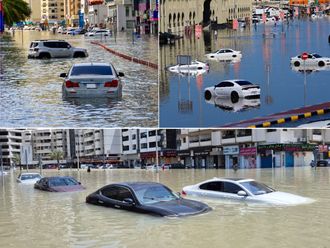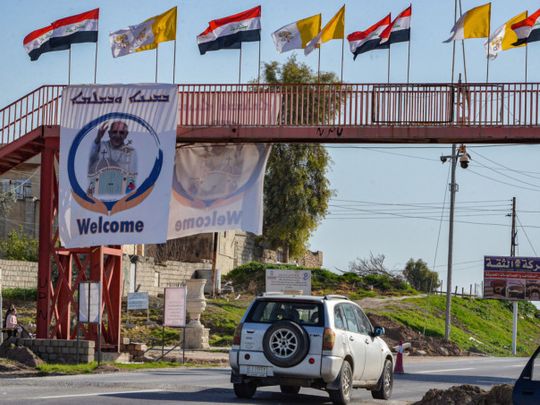
Cairo: Pope Francis is due to land in Iraq Friday on the first visit by the head of the Catholic Church to the Middle Eastern country long roiled by conflicts. The whirlwind four-day trip will take the 84-year-old pontiff to several sites in Iraq amid security and pandemic concerns.
The visit will be Francis’ first outside Italy in more than a year after previous foreign trips were cancelled due to the global pandemic. It is heralded as a visit of solidarity with and hope for Iraq’s minority Christians who have felt the impact of decades of wars, sectarian strife and atrocities by the Daesh terrorists.
Why Iraq?
Iraq is the birthplace of the Prophet Ebrahim or Abraham, revered by Muslims, Christians and Jews. With Christanity in Iraq dating back to the first century, the country’s Christian numbers have largely dwindled from around 1.5 million before the 2003 US-led invasion to estimated 200,000 at present.
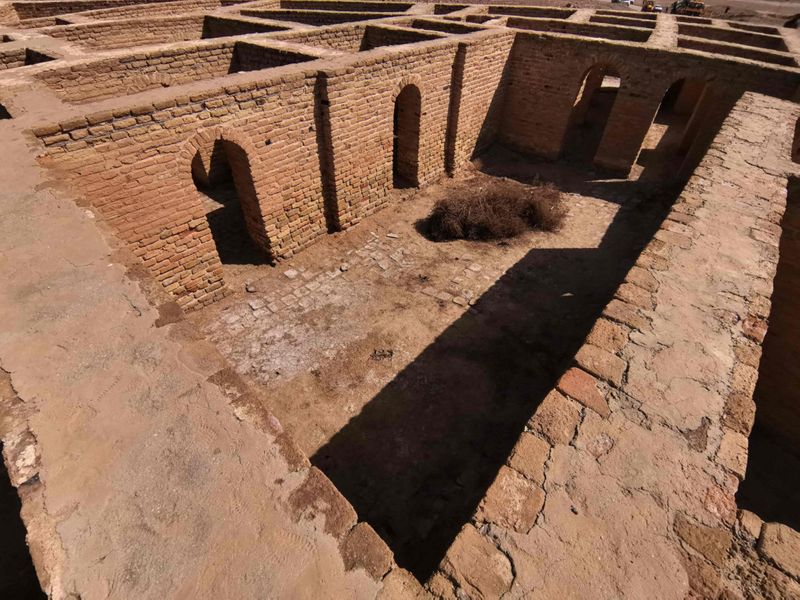
Christians were among the groups atrociously targeted by Daesh extremists when they swept through Iraq in 2014. During their rule of large swathes of Iraq, Daesh went on rampage against Christians and Yazidis, another Iraqi minority community, and destroyed their heritage sites.
Symbolism of stopover in Mosul
Thousands of Iraqi Christians were forced to flee their hometowns for safety into the autonomous Iraqi region of Kurdistan or abroad. During his March 5-8 trip, the pope will make several stops in Iraq including in the northern city of Mosul, a one-time stronghold of Daesh where the terrorist group’s horrors are still etched on the walls of churches. More than three years after Daesh militants were evicted from Mosul, many native Christians have not yet returned to their homes there.
In Mosul, Francis is scheduled to visit Hosh Al Bieaa or the “Church Square” – a site housing four churches of different denominations. He will there recite a prayer of suffrage for the victims of war. One of the four — the Syriac Catholic Church of Al Tahera — is being restored by the UN cultural agency, UNESCO, a process funded by the UAE.

‘Steadfast in land of ancestors’
As part of his itinerary, the pontiff will also lead a Mass at a stadium in Erbil, the capital of Iraqi Kurdistan, in a gesture of support for the displaced Christians.
“Pope Francis comes to Iraq in the first place to encourage the Christian community in Iraq which has withstood political turbulences that took place including foreign wars or in-fighting,” said Father Rif’at Bader, the director of the Catholic Centre for Studies and Media.
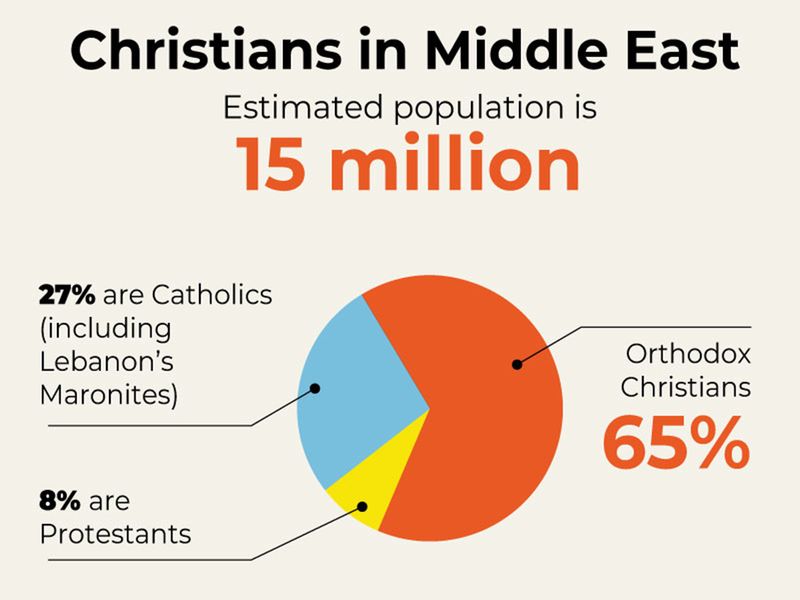
“The Pontiff wants to encourage those who are steadfast in the land of their ancestors in spite of the successive disasters especially during his scheduled visit to the city of Erbil, where there are currently good numbers of forcibly displaced people from Mosul and the towns of the Nineveh Plain,” Bader added in a recent article.
“Pope Francis will definitely send a message for the pursuit of paths of peace, dialogue, fraternity, cooperation and constructive cooperation among the various politicians in Iraq in order to rebuild a strong modern Iraqi state after years of hard and bitter wars, sectarian squabbles, and attacks by terrorist groups, so as to restore the spirit of hope among all Iraqis, especially the youth, for a better future,” said Bader.
There are 14 officially recognised Christian sects in Iraq.
■ CHALDEANS
Chaldeans are the most numerous of Iraq’s Christians, up to 80% of the group. The Chaldean Church is Eastern Rite affiliated with the Roman Catholic Church but allowed to keep its traditions and rituals.
It was founded in Mesopotamia, what is now modern-day Iraq, in the first century AD. The church is based in Baghdad and headed by Cardinal Louis Raphael Sako. Most Chaldeans live in Iraq, Iran and Lebanon.
They speak a version of Aramaic, a Semitic language spoken at the time of Jesus. There are 110 Chaldean churches across Iraq.
■ SYRIACS
Syriacs make up about 10% of Iraqi Christians. They include Catholics, which are the majority, and Orthodox. The northern towns of Qaraqosh, Bashiqa and Bartella house the biggest Syriac community in the country.
The main Syriac Catholic church is based in Lebanon while the Orthodox church is based in Syria. There are 82 Syriac churches in Iraq, both Catholic and Orthodox.
■ ASSYRIANS
Assyrians including Assyrian Catholics make up around 5% of Christians in Iraq. Most are originally from Iran and Turkey. Many of them fled to Iraq following the massacres by the Ottoman army during World War I. Assyrians refer to the killing of their people in 1915 as a genocide, which took place around the same time as the massacre of Armenians. There are 21 Assyrian churches in Iraq, 17 of them in Baghdad.
■ ARMENIANS
About 3% Assof Iraqi Christians are Armenian. After the Armenian genocide in 1915-1923 by the Ottoman Empire, many of them fled to Iraq. They speak Armenian. There are 19 Armenian churches in Iraq, both Orthodox and Catholic.
■ ARABS, SMALLER GROUPS
Arab Christians make up about 2% of the Iraqi Christian population. There are also three Greek Orthodox and four Coptic Orthodox churches in Baghdad and 57 Roman Catholic churches across the country, as well as a small number of Protestants.
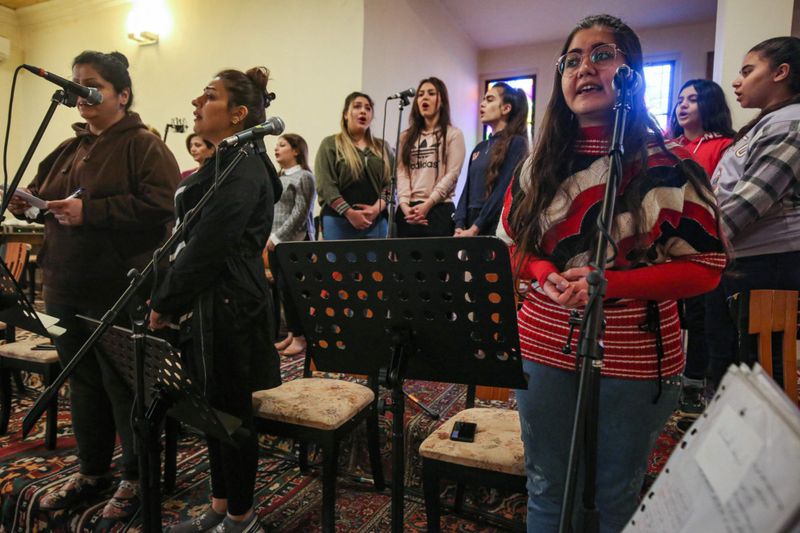

‘You are all brothers’
In a country long plagued by divisions, the official logo of the papal trip is significantly “You are all brothers”.
The late pope John Paul II had planned to visit Iraq in 2000, but the visit was cancelled after related talks broke down with the Iraqi government of Saddam Hussein.
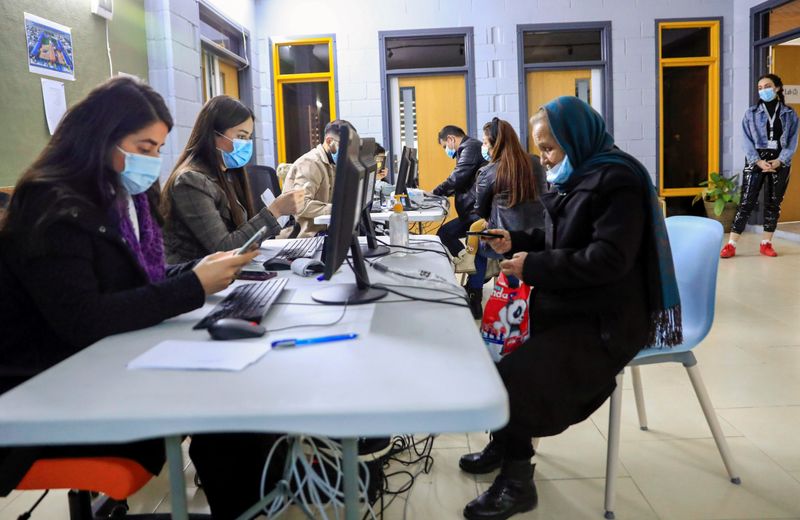
Support for the region’s Christians
By and large, the pope’s trip to Iraq is seen as also symbolically important for the Middle Eastern Christians whose destinies have been affected by regional feuds and political unrest in several of their home countries. Francis has repeatedly voiced concern about the situation of Christians in the region. He once said that he and other Catholic leaders will not resign themselves to “imagining a Middle East without Christians”.
Building on inter-faith harmony
An advocate of inter-faith harmony and diversity, Francis is scheduled Saturday to hold an inter-religious prayer service in Ur, the Mesopotamian birthplace of the Prophet Ebrahim in southern Iraq. The gathering will follow a courtesy visit to Iraq’s top Shiite Muslim cleric Ali Al Sistani in the holy city of Najaf.
■ In Syria, devastated by a decade-long war, the numbers of Christians were estimated at 2.3 million people or 11.2 per cent of the country before the war. The figure dropped to 1.9 million due to an exodus prompted by the war and militant attacks, according to unofficial estimates. Syria’s largest Christian denomination is the Greek Orthodox Church with about 500,000 followers. Like their co-religionists in neighbouring Iraq, Syrian Christians have been persecuted by Daesh extremists.
■ Long seen as a safe haven for Christians across the Middle East, Lebanon has the largest Christian community in the region, accounting for a third of the country’s total population of 6.8 million, according to unofficial figures.
■ However, Lebanese media has recently reported that about 380,000 migration applications, mainly from Christians have been made since a deadly explosion at the Beirut port last August amid public discontent with the country’s ruling class.
■ While there are no reliable data about the exact numbers of Christians in the Middle East, they are believed to stand at about 15 million. The majority or about 65 per cent of them are Orthodox Christians. Catholics are believed to account for around 27 per cent of the total Christians while the rest are Protestants.
■ In contrast to their declining communities in Iraq and Syria, the numbers of migrant Christians are increasing in the Gulf countries.
■ Copts, who make up around 10 per cent of Egypt’s overall population of about 108 million people, stand out as the largest Christian community in the Middle East.
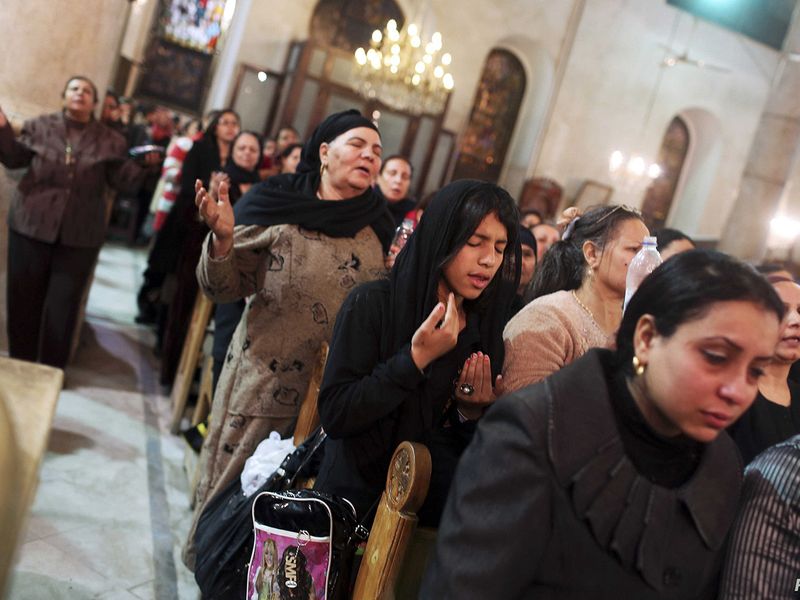
Landmark trip to the UAE
The Iraq visit will come two years after Francis made a landmark trip to the UAE, marking the first ever by a pontiff to the Arabian Peninsula. In the UAE, he met Sheikh Ahmed Al Tayyeb, the Grand Imam of Al Azhar, which is the influential seat of Sunni Islamic learning. The two clergymen signed a milestone instrument dubbed “The Document on Human Fraternity for World Peace and Living Together”.
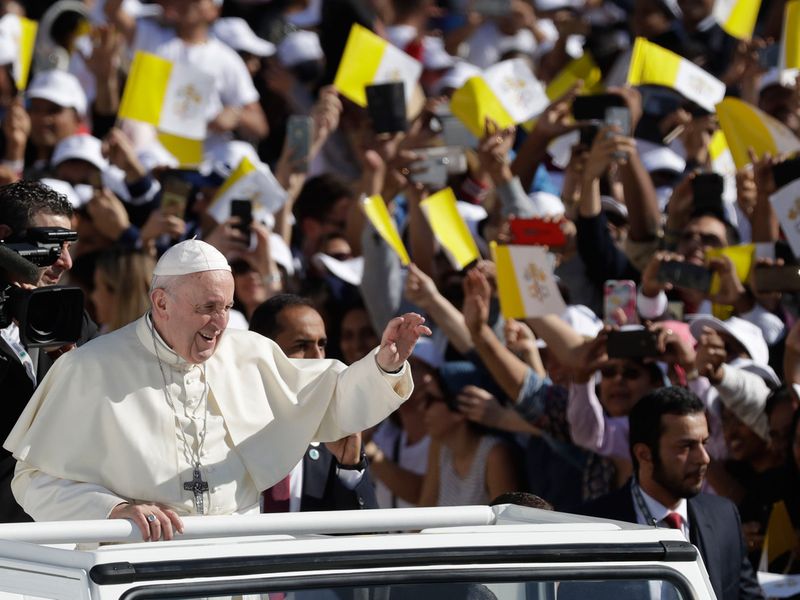
Hopes for Iraq’s stability
The papal trip could not be more well-timed for Iraq. The Iraqi government is grappling with a litany of political turmoil, terrorist attacks, an outbreak of COVID-19 and an economic crisis. Prime Minister Mustafa Al Kadhimi, who took office last May, pins hope on the visit that his government has described as an “historic” event and a “message of peace”.
“Pope’s visit will contribute to consolidating stability and promoting spirit of fraternity in Iraq and the rest of the region,” Al Kadhimi said in recent remarks.
Having declared victory over Daesh in December 2017, Iraq still continues to experience militant attacks. In January, 32 people were killed in twin suicide bombings in Baghdad claimed by Daesh. In recent months, Iraq has seen a surge in attacks on US-led coalition forces blamed on Iran-allied groups.
However, some Iraqi voices have cautioned against high expectations from the pontiff’s trip. It is “a historic and exceptional visit, given the circumstances in which the country and the region is living,” said Cardinal Louis Raphael Sako, the Chaldean Catholic Patriarch of Baghdad. “The Holy Father does not come to solve all problems, but rather to express his solidarity and stand with the Iraqis,” Sako added.




